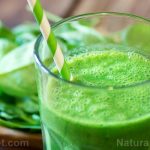
Header Menu
Take your protein supplements with meals to improve your resistance training
Thursday, September 06, 2018 by Michelle Simmons
http://www.naturalnewsnutrients.com/2018-09-06-take-your-protein-supplements-with-meals-to-improve-your-resistance-training.html

Protein supplements taken with meals was found to be more effective at improving resistance training compared to taking them between meals, according to a systematic review published in the journal Nutrition Review. On the other hand, protein supplements taken between meals may be more effective at increasing overall body mass.
A team of researchers from Purdue University aimed to evaluate the effect of protein supplement intake with meals and between meals on resistance training-induced body composition changes in adults. In conducting the study, the research team looked at a total of 34 randomized controlled trials with 59 intervention groups. All of the participants in the intervention groups were healthy adults with an average age of 19 years and older. Protein supplements, including bovine colostrum, casein, rice, soy, and whey, were included if they were isolates, concentrates, or hydrolysates taken alone or in combination with other nutrients and sources of proteins.
Results revealed that protein supplements consumed with meals increased lean mass, reduced fat mass, and increased the ratio of lean mass to fat mass over time better than when protein supplements were taken in between meals. On the contrary, taking protein supplements in between meals resulted in more body mass increases compared to consuming protein supplements with meals.
“The decrease in fat mass fits within the results of this systematic review, which showed a consistent increase in lean mass and an inconsistent change in body mass. Since lean mass consistently increased and body mass change was inconsistent, it follows that fat mass would decrease,” explained the research team.
In conclusion, taking protein supplements with meals may be more effective for weight control than consuming them between meals in adults who are undergoing a resistance training routine. The findings of the review indicated the importance of timing of protein supplement intake, which relies on the body weight and body composition goal of a person. (Related: Feeling old? Supplement diet with leucine prevents muscle loss linked to ageing (press release).)
Different types of protein supplements
There are three common forms of protein powders: concentrates, isolates, and hydrolysates. They come from a variety of sources. Here are some types of protein powder supplements you can try:
- Casein protein – Casein is made with the use of a separation process applied to liquid milk that can concentrate or isolate the milk protein from the carbs and fats. This type of supplement provides the same benefits like whey protein although through a different release process. Unlike whey protein, it is digested for a longer period of time, which makes it best to consume before bedtime and not for post-workout.
- Egg protein – Egg protein is a complete protein produced by segregating the yolks and dehydrating the egg whites. This supplement is packed with vitamins and minerals that can contribute to a healthy diet.
- Rice protein – Protein from brown rice is a good source of complex carbohydrates, vitamin B, and fiber. Moreover, it is hypoallergenic, which means that it is digested by the body easily. Thus, it is almost completely utilized by the body and not relieved as waste.
- Soy protein – Soybeans are one of the several plant-based sources of protein that provide all of the essential amino acids. After the soybeans have been hulled and dried into soy flour, the protein is concentrated. Soy protein may help enhance the immune function of the body and support bone health. In addition, it may help fight against cardiovascular disease and lower the risk of certain cancers.
- Whey protein – Whey protein is the most popular protein supplement available on the market today. It is a byproduct in the process of turning milk into cheese. This type of supplement is effective for promoting lean muscle growth and fat loss, as well as supporting cardiovascular health and a healthy metabolism. This is best for post-workout recovery as it is quickly absorbed by the body.
Read more news stories and studies on protein supplements by going to SupplementsReport.com.
Sources include:
Tagged Under: Tags: Body composition, body weight, bovine colostrum, casein, Diets, exercise, fitness, goodhealth, mind body science, nutrients, nutrition, protein powder, protein supplements, resistance training, slender, soy, strength training, supplements, timing, weight control, weight goals, weight loss, weight management, whey





